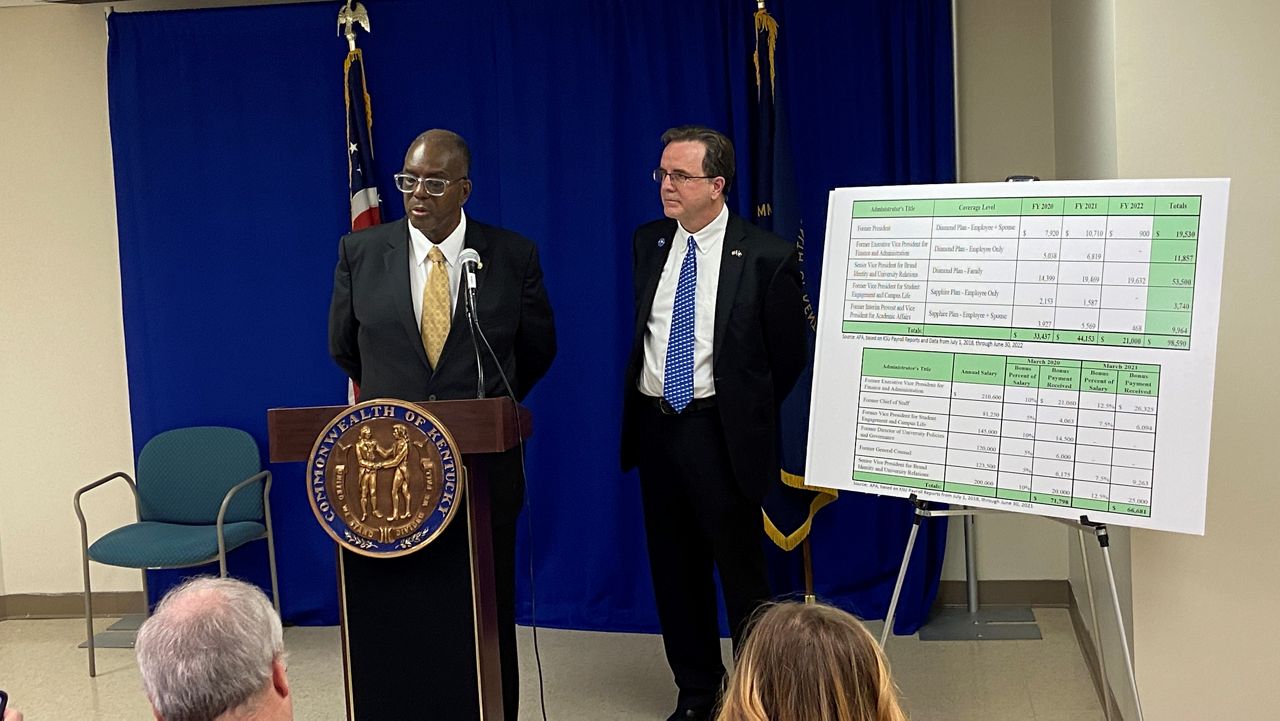FRANKFORT, Ky. — A state audit of Kentucky State University's finances revealed a “chaotic accounting environment" leading to undocumented credit card transactions, extravagant bonuses and a lack of controls that put millions in federal grant funding at risk, Auditor Mike Harmon said Wednesday.
What You Need To Know
- A state audit of Kentucky State University's finances revealed a “chaotic accounting environment" leading to undocumented credit card transactions, extravagant bonuses and a lack of controls that put millions in federal grant funding at risk
- The report contained 20 findings identified as “significant issues,” and Harmon's office referred its findings to federal and state prosecutors
- Kentucky lawmakers last year ordered the special examination to drill down into the finances at the historically Black university
- In a response included in the auditor's report Wednesday, KSU interim President Ronald A. Johnson said his administration is committed to addressing the problems
The report contained 20 findings identified as “significant issues,” and Harmon's office referred its findings to federal and state prosecutors.
Kentucky lawmakers last year ordered the special examination to drill down into the finances at the historically Black university. The examination primarily focused on KSU's financial and internal policies between July 1, 2018, and June 30, 2021.
“The many problems found in our examination did not happen overnight, and frankly they will not be solved overnight," Harmon said as his office presented the findings. “What is clear is that past practices at KSU detailed in our exam report must come to an end.”

The public university is in the midst of searching for a new president at its Frankfort campus. Kentucky State has been without a permanent president since July 2021, when M. Christopher Brown II resigned amid growing concerns about KSU’s financial health.
In a response included in the auditor's report Wednesday, KSU interim President Ronald A. Johnson said his administration is committed to addressing the problems.
Harmon's office, in a news release, pointed to a “chaotic accounting environment that lacked effective safeguards and responsible management” — reaching all the way to the university's board.
The auditor's blistering report detailed systemic problems at the school, including “weak to non-existent internal controls,” extensive credit card use that lacked supervisory reviews or supporting documentation, inaccurate or incomplete accounting practices, and failures to prevent overspending.
“Our work was significantly impacted by KSU’s inadequate or non-existent record keeping and continuously high rate of employee turnover,” the report said.
The examination revealed missing or unsupported documentation on KSU's expenditure of federal grant funds, putting the school at risk of having more than $3.3 million in questioned costs, the auditor's office said. The office said it would refer the finding to the U.S. Treasury and Education departments.
Other findings in the report included:
- More than $1.3 million in credit card transactions made in each of the three fiscal years reviewed, with little to no documentation on most of the purchases selected for review.
- Use of a fund designated for recognition of faculty, staff and students that was used to pay for costs associated with a daylong retreat for the university’s board.
- Former university administrators receiving unallowable benefits, including bonuses and supplemental health insurance. KSU paid bonuses totaling more than $138,000 to select administrators over a two-year period, though no policy or contract existed to permit the award, the report said.
Harmon noted that it's not the first special examination of KSU's finances. A report from the auditor's office in 2000 highlighted many of the same issues that still exist, he said.
“The big question now is, what’s next for KSU?" Harmon said. "Our examination makes numerous recommendations for the university to address areas of concern identified in the report.
“Ultimately, changes within the university will need to be made and carried out by KSU’s next president, KSU board, university administrators and, to a certain extent, the General Assembly,” he added.
Lawmakers passed a bill last year setting aside $23 million to help KSU cover a shortfall, with another $15 million through the Council on Postsecondary Education.
Sen. Gex Williams, R-Verona, who was elected in November and whose district includes Franklin County, said in a statement that the examination of KSU “finds the height of bureaucratic corruption and abuse of taxpayer and donor trust.”
“The fact that students, staff and alums have been subject to the turmoil the audit has uncovered is a tragedy in my mind," he added. "I am encouraged by the words and leadership of KSU Interim President Ronald Johnson, but I hope those responsible are held accountable.”



